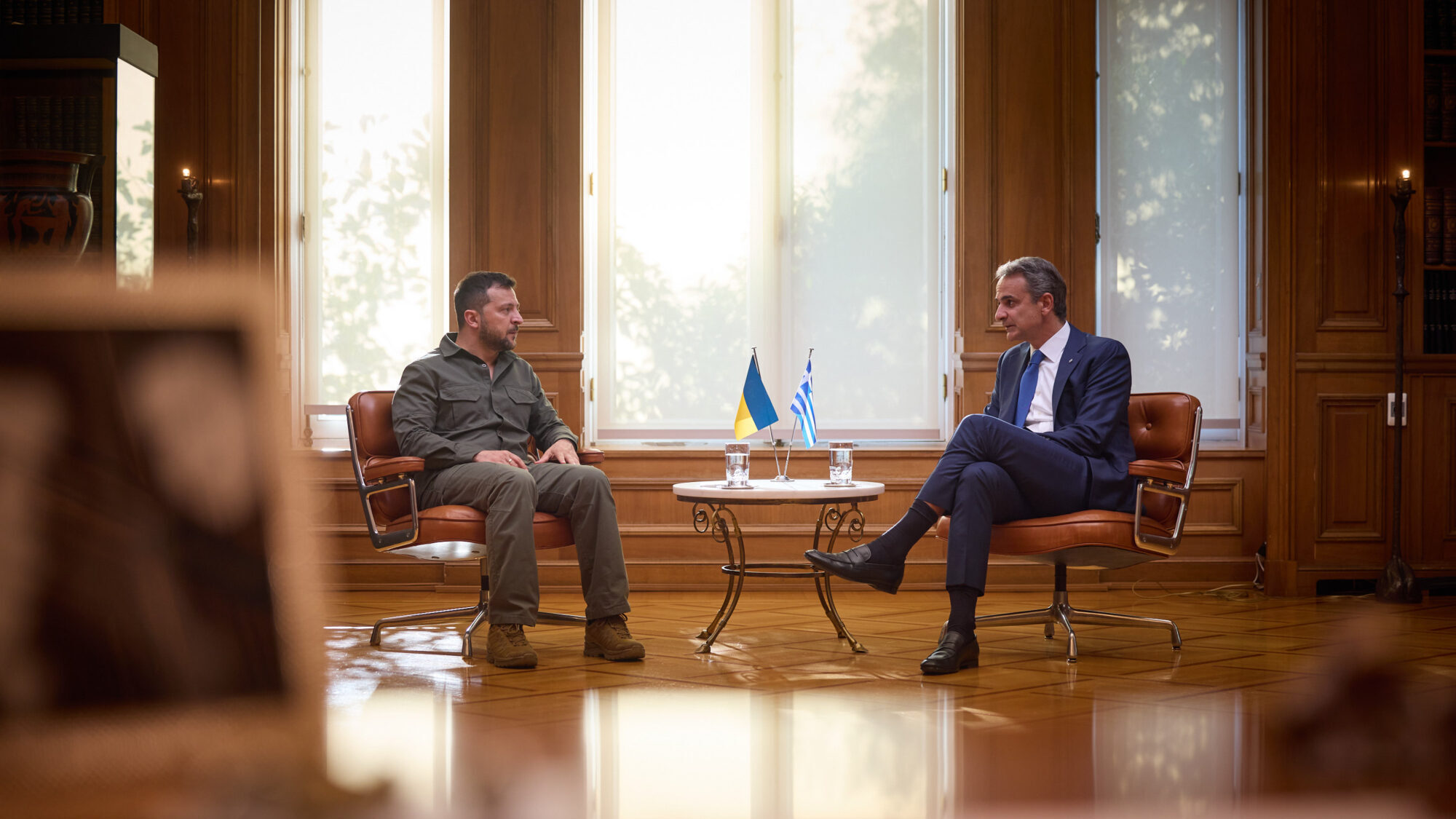
Ukrainian President Volodymyr Zelensky and Greek Prime Minister Kyriakos Mitsotakis.
Photo: www.president.gov.ua
President Zelensky has broached the possibility of Greece taking a leading role in the reconstruction of the strategically important port city of Odesa after meeting with Greek PM Kyriakos Mitsotakis in Athens yesterday as the Greek government confirmed their intention to back Kyiv’s floundering bid to join the EU.
Zelensky and other Western leaders, including Commission President von der Leyen, were in Athens for informal talks to discuss the geopolitically thorny issue of Western Balkan accession into the EU. Serbia, Albania, Montenegro, and Macedonia are all looking to be onboarded into the Union to secure Europe’s flank following Russia’s invasion of Ukraine.
Five outcomes of our talks with Prime Minister @KMitsotakis.
— Володимир Зеленський (@ZelenskyyUa) August 21, 2023
1. Greece joined the aviation coalition: it will train our pilots to fly F-16s. Greece is also preparing a new military aid package for Ukraine.
2. I proposed ways for Greece to assist us in securing Ukraine’s new… pic.twitter.com/saayynoA5I
Greece is regarded as a powerbroker in the Western Balkan accession process, a fact complicated by an ongoing diplomatic rift between Albania and Athens over the arrest of an ethnic Greek mayor in Albania on charges of vote rigging, which contributed to the Albanian PM being excluded from the talks.
After securing the promise of Dutch and Danish F-16 fighter jets over the weekend, Zelensky travelled to the Athens talks in the hope of currying Greek favour for his country’s EU membership bid currently on the rocks. Media leaks have described how European officials are having doubts about the logistics of economically integrating Ukraine into the EU.
Following talks with Greece’s centre-right EPP-aligned PM Kyriakos Mitsotakis, Zelensky announced that Greece would contribute to a new aviation coalition as well as assist in safeguarding the Black Sea trade routes. The export routes, important for the flow of Ukrainian grain into the Global South, have come under pressure from Russian aerial and naval attacks.
Zelensky confirmed that Greece would back Ukraine’s EU membership application in upcoming negotiations. The Ukrainian President also congratulated the Greeks on support for the military integration of Kyiv into the “Euro-Atlantic” alliance. The gathering ended with a declaration in support of Ukrainian territorial integrity and repeatedly referenced the 2003 Thessaloniki Declaration which outlined the long term goal of integrating the region into the EU.
Athens, an important NATO and American ally, has furnished the Ukrainian army with armoured personnel carriers and ammunition with Greek Defence Minister Nikos Panagiotopoulos saying in April that the country was willing to back the Kyiv government “as long as it takes.”
Despite this, in May, Greek diplomatic figures attempted to put the kibosh on fresh sanctions targeting its sprawling shipping industry, which many pro-Ukranian pundits allege is enabling Russia to bypass Western sanctions.
The leaders also discussed Greece taking a leading role in the repair of the battered port city of Odesa, Ukraine’s third most populous city, located on the coast of the Black Sea. Odesa was hit by cruise missiles in the initial stages of the Russian invasion, and several historic buildings, including its Cathedral of the Holy Transfiguration, were damaged during an attack in July of this year. Its historically important city centre, which was designated a UNESCO heritage site in January this year, is of specific concern.
Taking a front-row seat in rebuilding Odesa could give Greece an economic advantage when dictating post-war trading arrangements with the city (originally founded as a Greek settlement) already an important hub for Greek shipping companies.
While Ukraine’s EU candidacy is expected to remain in the political doldrums for years to come, the suggestion that Greece could take advantage of a specific part of the recovery could set the tone for future post-war bargaining. In June, Britain hosted a star-studded conference of political leaders and business interests regarding Ukraine’s reconstruction with one eye on the country’s natural resources as the Ukrainian counteroffensive appears to be increasingly bogged down.
